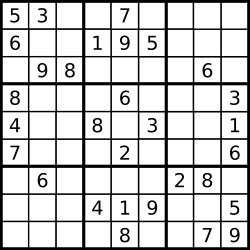[LeetCode] 36. Valid Sudoku 验证数独
Determine if a 9x9 Sudoku board is valid. Only the filled cells need to be validated according to the following rules:
- Each row must contain the digits
1-9without repetition. - Each column must contain the digits
1-9without repetition. - Each of the 9
3x3sub-boxes of the grid must contain the digits1-9without repetition.

A partially filled sudoku which is valid.
The Sudoku board could be partially filled, where empty cells are filled with the character '.'.
Example 1:
Input: [ ["5","3",".",".","7",".",".",".","."], ["6",".",".","1","9","5",".",".","."], [".","9","8",".",".",".",".","6","."], ["8",".",".",".","6",".",".",".","3"], ["4",".",".","8",".","3",".",".","1"], ["7",".",".",".","2",".",".",".","6"], [".","6",".",".",".",".","2","8","."], [".",".",".","4","1","9",".",".","5"], [".",".",".",".","8",".",".","7","9"] ] Output: true
Example 2:
Input:
[
["8","3",".",".","7",".",".",".","."],
["6",".",".","1","9","5",".",".","."],
[".","9","8",".",".",".",".","6","."],
["8",".",".",".","6",".",".",".","3"],
["4",".",".","8",".","3",".",".","1"],
["7",".",".",".","2",".",".",".","6"],
[".","6",".",".",".",".","2","8","."],
[".",".",".","4","1","9",".",".","5"],
[".",".",".",".","8",".",".","7","9"]
]
Output: false
Explanation: Same as Example 1, except with the 5 in the top left corner being
modified to 8. Since there are two 8's in the top left 3x3 sub-box, it is invalid.
Note:
- A Sudoku board (partially filled) could be valid but is not necessarily solvable.
- Only the filled cells need to be validated according to the mentioned rules.
- The given board contain only digits
1-9and the character'.'. - The given board size is always
9x9.
数独 是一种逻辑性的数字填充游戏,玩家须以数字填进每一格,而每行、每列和每个宫(即3x3的大格)有齐1至9所有数字。游戏设计者会提供一部分的数字,使谜题只有一个答案。
题目要求验证一个方阵是否为数独,判断标准是看各行各列是否有重复数字,以及每个小的3x3的小方阵里面是否有重复数字,如果都无重复,则当前矩阵是数独。但不代表该数独有解,只是判断当前未填完的矩阵是否是数独。
解法:遍历方阵中的每个数字,检查包含当前位置的行和列以及3x3小方阵中是否已经出现该数字,需要分别记录行,列,小方阵是否出现该数字。
Java:
public class Solution {
static int position[]=new int[]{2,4,8,16,32,64,128,256,512};
/**
* 分别判断行 列 和 格子内的就可以了~~~
* 这里我使用的位运算来降低内存。。都是2的n次,那么对应的位置上直接使用位运算就能判断了
* */
public boolean isValidSudoku(char[][] board) {
int col[]=new int[9];
int row[]=new int[9];
int zone[]=new int[9];
int i,j,mask,qid;
for(i=0;i<9;i++){
for(j=0;j<9;j++){
if(board[i][j]=='.')
continue;
mask=position[board[i][j]-'1'];
qid=(i/3)*3+j/3;
if( (col[j] | mask) == col[j] || (row[i] | mask) == row[i] ||(zone[qid] | mask) == zone[qid])
return false;
col[j]=col[j]|mask;
row[i]=row[i]|mask;
zone[qid]=zone[qid]|mask;
}
}
return true;
}
}
Java:
public class Solution {
//置为静态变量
static Map<Character,Integer> map = new HashMap<Character,Integer>();
public boolean isValidSudoku(char[][] board) {
//判断每行
for(int i = 0; i < board.length; i++){
initMap();//每次均需初始化
for(int j = 0; j < board[0].length; j++){
//是数字
if(board[i][j] >= '0' && board[i][j] <= '9'){
if(map.get(board[i][j]) > 0){//说明重复数字
return false;
}else{
map.put(board[i][j],1);
}
}else if(board[i][j] != '.'){//出现空格和0-9之外的字符
return false;//直接返回false
}
}
}
//判断每列
for(int i = 0; i < board[0].length; i++){
initMap();//每次均需初始化
for(int j = 0; j < board.length; j++){
//是数字
if(board[j][i] >= '0' && board[j][i] <= '9'){
if(map.get(board[j][i]) > 0){//说明重复数字
return false;
}else{
map.put(board[j][i],1);
}
}else if(board[j][i] != '.'){//出现空格和0-9之外的字符
return false;//直接返回false
}
}
}
//判断九宫格
for(int i = 0; i < board.length - 2; i = i+3){//行{
for(int j = 0; j < board[0].length - 2; j=j+3){
initMap();//初始化
for(int m = i; m < i + 3;m++){
for(int n = j; n < j+3; n++){
//是数字
if(board[m][n] >= '0' && board[m][n] <= '9'){
if(map.get(board[m][n]) > 0){//说明重复数字
return false;
}else{
map.put(board[m][n],1);
}
}else if(board[m][n] != '.'){//出现空格和0-9之外的字符
return false;//直接返回false
}
}
}
}
}
return true;
}
//初始化map为每个key均赋值0
private void initMap(){
for(char i = '0';i <= '9'; i++){
map.put(i,0);
}
}
}
Python:
class Solution(object):
def isValidSudoku(self, board):
"""
:type board: List[List[str]]
:rtype: bool
"""
for i in xrange(9):
if not self.isValidList([board[i][j] for j in xrange(9)]) or \
not self.isValidList([board[j][i] for j in xrange(9)]):
return False
for i in xrange(3):
for j in xrange(3):
if not self.isValidList([board[m][n] for n in xrange(3 * j, 3 * j + 3) \
for m in xrange(3 * i, 3 * i + 3)]):
return False
return True
def isValidList(self, xs):
xs = filter(lambda x: x != '.', xs)
return len(set(xs)) == len(xs)
C++:
class Solution {
public:
bool isValidSudoku(vector<vector<char> > &board) {
if (board.empty() || board[0].empty()) return false;
int m = board.size(), n = board[0].size();
vector<vector<bool> > rowFlag(m, vector<bool>(n, false));
vector<vector<bool> > colFlag(m, vector<bool>(n, false));
vector<vector<bool> > cellFlag(m, vector<bool>(n, false));
for (int i = 0; i < m; ++i) {
for (int j = 0; j < n; ++j) {
if (board[i][j] >= '1' && board[i][j] <= '9') {
int c = board[i][j] - '1';
if (rowFlag[i][c] || colFlag[c][j] || cellFlag[3 * (i / 3) + j / 3][c]) return false;
rowFlag[i][c] = true;
colFlag[c][j] = true;
cellFlag[3 * (i / 3) + j / 3][c] = true;
}
}
}
return true;
}
};
All LeetCode Questions List 题目汇总



 浙公网安备 33010602011771号
浙公网安备 33010602011771号